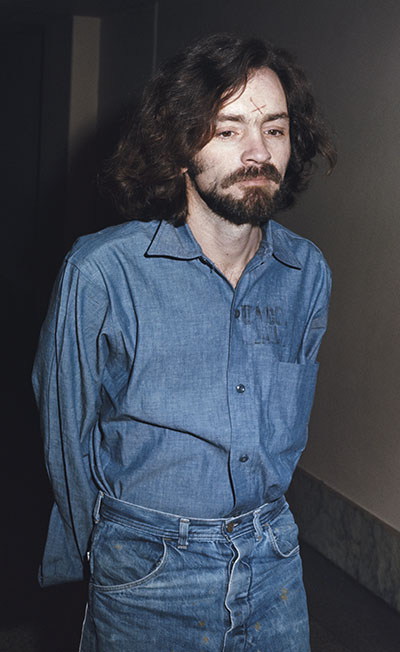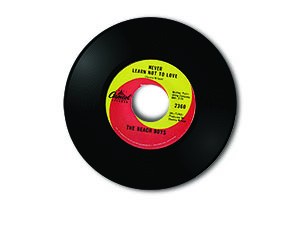After a long night of recording with The Beach Boys—the platinum-selling band he had started with his brothers Brian and Carl and their cousin, Mike Love—drummer Dennis Wilson, at three o’clock on an April morning in 1968, steered his Ferrari into the driveway of his rented Los Angeles mansion. Wilson noticed lights blazing inside and a beat-up school bus outside. The rock star enjoyed visitors—he loved a good time and encouraged friends to drop by—but didn’t recognize the bus. Wilson, 23, parked. As he walked warily toward his house, a long-haired man with a scraggly beard stepped out.
“Are you going to hurt me?” Wilson asked.
“Do I look like I’m going to hurt you, brother?” the stranger replied, smiling. He knelt and kissed Wilson’s feet, then stood and, like a welcoming host, gallantly ushered the musician into his own house.
Inside, a Beatles album was blaring from the stereo. A dozen young women, several of them topless, were partying. Wilson recognized two girls. The previous afternoon he’d picked them up hitchhiking and brought them to his house, where they’d shared a snack of milk and cookies. Wilson didn’t say who he was but did mention being a devotee of Maharishi Mahesh Yogi, guru to the Beatles. The girls said they, too, had a guru—a wise, saintly man named Charlie. Now, 12 hours later, Wilson’s new friends introduced him to Charlie, who had just kissed his feet.
Charlie was Charles Manson. Born to an unwed 16-year-old in Cincinnati in 1934, he had spent more than half his life behind bars. His first arrest came at 13, for burglarizing a grocery store, followed by repeated incarcerations for stealing cars and pimping. Manson passed most of the early 1960s in the federal prison on McNeil Island, Washington, where he took guitar lessons from Alvin “Creepy” Karpis, the infamous bank robber from the Ma Barker gang. Manson also studied Scientology and took a Dale Carnegie course on “How to Win Friends and Influence People.” In both classes, he paid close attention to lessons in the art of manipulating the naïve and the unwary. Released in 1967, he moved to San Francisco during the hippie “Summer of Love.” Using his skills in manipulation—and plenty of LSD—Manson attracted a circle of young women who believed him to be a holy man, or maybe God Himself.

By spring 1968, Manson and his “family” had migrated to Los Angeles. Once in Dennis Wilson’s living room, the Manson family showed no sign of leaving—not that Wilson minded. A free spirit, he was always up for a party, particularly one involving willing young women. And Manson made clear that his girls were willing.
Dennis loved frolicking with Charlie’s harem but he also enjoyed his long conversations with Manson. Like the Maharishi, Charlie discoursed on heavy theological issues, rapping about good and evil, God and the devil, and how those opposites were actually identical, which meant feeling guilty about anything was folly. Charlie preached that parents ruin their kids, a theme that resonated with Dennis, whose own father was nasty and brutal. Dennis thought Manson “deep” and called him “The Wizard.”
Of course, Manson, who wrote songs and wanted to be a rock star, was hustling Dennis. He figured Wilson could help him get a contract with the Beach Boys’ company, Brother Records. Charlie played his songs for Dennis, who concluded that he was hearing genius. “Charlie Manson is another friend of mine, who says he is God and the devil,” Dennis told a British music magazine. “He sings, plays and writes poetry and may be another artist for Brother Records.”
The Manson family spent most of the summer of 1968 camping out at Wilson’s house, raiding his refrigerator, skinny-dipping in his pool, and sleeping with him. For laughs, Dennis would load his Ferrari with Manson girls and drive to a supermarket to watch them Dumpster-dive for discarded vegetables.
“Dennis was the perfect mark—a famous, well-connected entertainer who could help a musical neophyte get discovered,” Beach Boy Mike Love wrote in Good Vibrations, a 2016 memoir. “Dennis was all too happy to allow Manson and his girls to move in, use his charge cards, take his clothes, eat his food, even drive his Mercedes. Manson, after all, had something for Dennis—a stable of young women who catered to his every desire.”
Dennis introduced Manson to several Beach Boys and arranged for Charlie to record his songs. Engineer Stephen Desper thought the songs were pretty good but was leery of Charlie, who smelled bad and brandished a switchblade. “This guy is psychotic,” Desper told a colleague.
Dennis convinced the Beach Boys to record a Manson composition. Charlie called the song “Cease to Exist” but Dennis revised the lyrics and retitled it “Never Learn Not to Love.” It became the B-side of the December 1968 Beach Boys single “Bluebirds Over the Mountain.” Manson was flattered, but also peeved that his patron changed his lyrics and didn’t credit him for the song.

By then, Dennis had soured on Charlie. The “family” had run up enormous bills on Wilson’s credit card. One crony of Charlie’s had totaled Wilson’s Ferrari; another had crashed his Mercedes. But Dennis lacked the guts to kick Manson out—he, too, was scared of Charlie’s switchblade and hot temper. Dennis simply moved, leaving his landlord to deal with the moochers.
When the eviction notice came, Manson and followers colonized a rundown ranch in the desert. Charlie became obsessed with the Beatles’ “White Album.” He thought the song “Helter Skelter” was predicting a race war, and fantasized that his “family” would emerge from the chaos to rule the world. On August 8, 1969, Manson ordered his followers to trigger this apocalypse by raiding a house in Los Angeles. They did, killing all five occupants, including actress Sharon Tate. The next night, invading the home of a family named LaBianca, the gang killed two more people, then scrawled “Healter Skelter” [sic] on a wall in blood.
In 1971, jurors convicted Manson and four followers of the murders, and they were sentenced to death; when California abolished that penalty in 1972, the sentence became life in prison. Manson, 82, now resides at Corcoran State Prison in Kings County, California.
Charlie’s old pal Dennis Wilson drowned while swimming drunk in 1983.
Police never suspected Wilson in the Manson murders, but during the investigation, officers interrogated him. Wilson told the cops that he’d housed Manson’s family for “several months” in 1968. The drummer estimated that his generosity had cost him $100,000, mostly in damage to his cars—but also his doctor’s fee for treating the entire “family” for venereal disease the Beach Boy had caught from Charlie’s angels.
“It was possibly the largest gonorrhea bill in history,” Dennis Wilson said.✯
This story was originally published in the March/April 2017 issue of American History magazine. Subscribe here.





